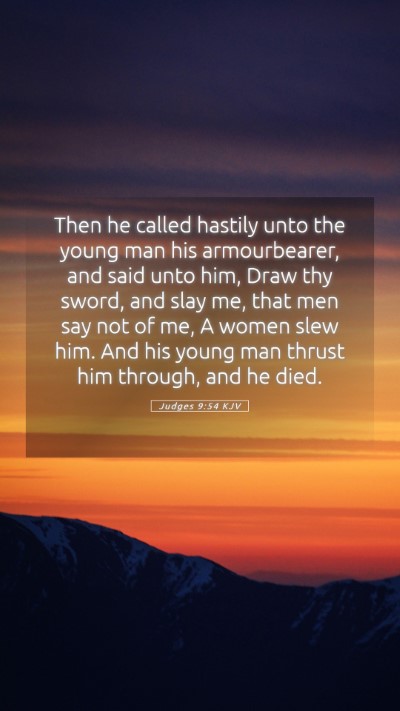Understanding Judges 9:54 - A Comprehensive Commentary
In the quest for Bible verse interpretations and Bible verse explanations, Judges 9:54 presents a powerful narrative that serves to illustrate themes of justice, retribution, and the consequences of one’s actions. This verse reads:
"Then he called hastily to the young man his armourbearer, and said unto him, Draw thy sword and slay me, that men say not of me, A woman slew him. And his young man thrust him through, and he died."
Verse Analysis
This verse occurs in the context of Abimelech, who was fatally wounded during a siege in Thebez. Not wanting to be remembered as having been killed by a woman, he instructs his armor-bearer to kill him. This speaks to the deep-seated cultural perceptions of honor and shame.
Key Themes from Public Domain Commentaries
-
Matthew Henry's Commentary:
Henry emphasizes the cowardice and pride of Abimelech. He states that wanting to maintain an appearance of valor led him to a desperate act, illustrating how the fear of disgrace can motivate individuals to commit further wrongs. Abimelech's end reflects the ultimate justice of God and counters the idea that he had achieved victory.
-
Albert Barnes Commentary:
Barnes focuses on the implications of Abimelech's demand. He recognizes that in trying to avoid a perceived dishonor, Abimelech brought about a fate worse than the dishonor he sought to avoid. The commentary explores the idea of legacy and how a person's life story can reflect their character, regardless of their attempts to control it.
-
Adam Clarke's Commentary:
Clarke provides a thorough exegesis of the cultural significance of Abimelech’s request. He notes that by asking for death at the hands of his armor-bearer, instead of a woman, he underscores the deep societal norms surrounding masculinity and valor in combat. Clarke's insights offer a wider lens on the life and choices of Abimelech, illustrating that his quest for power led to his downfall.
Lessons Learned
The tragic fate of Abimelech serves as a cautionary tale about:
- Pride and Honor: The lengths to which individuals will go to protect their reputation.
- Consequences of Actions: How one's immoral choices may result in adverse outcomes, not only for oneself but for others.
- Divine Judgment: The inescapable nature of divine justice as depicted throughout scripture.
Application of Judges 9:54 in Daily Life
As we explore how to interpret Bible verses such as this, we can draw personal applications that resonate with contemporary values:
- This verse encourages honest self-reflection regarding our motives and the impact of pride on decision-making.
- It prompts discussions on the importance of not allowing societal norms to dictate our choices and actions.
- Lastly, it reminds us to consider how our actions may be perceived by others, especially in moments of weakness or failure.
Bible Cross References
Judges 9:54 is related to several other biblical passages which enhance its meaning:
- 2 Samuel 1:6-10 - The death of Saul ties to themes of honor and the ambiguity of legacy.
- Esther 9:17-26 - The consequences of actions during times of conflict and the importance of narrative.
- Galatians 6:7 - The principle that one reaps what one sows resonates with Abimelech’s fate.
Conclusion
In conclusion, Judges 9:54 serves as a pertinent example within the broader spectrum of Bible study insights. The themes of pride, the pursuit of honor, and the ultimate realization of divine justice create rich ground for scripture analysis and Bible study lessons. As we navigate through this complex narrative, let us remain committed to understanding Scripture in its entirety, embracing both its historical context and its application to our lives today.


